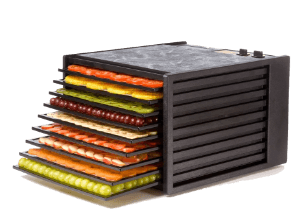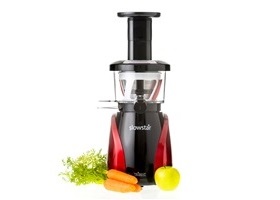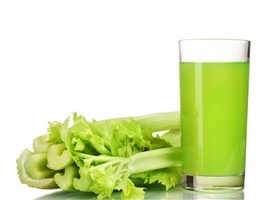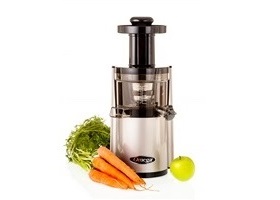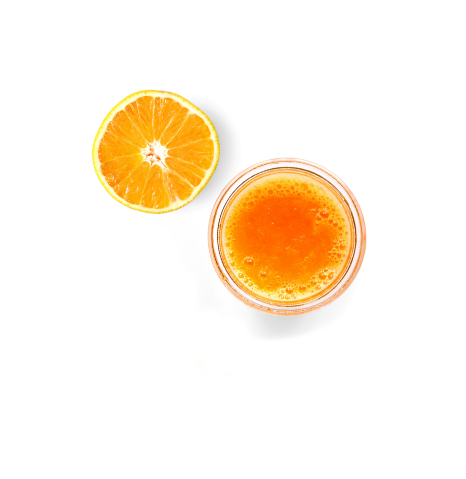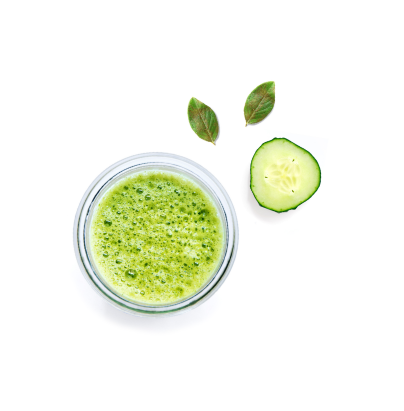Choosing Your Juicer
Choosing a Juicer
About Juicer Comparisons
About Long Product Warranties
About Juice Yield Testing
Choosing a Fruit and Vegetable Juicer
Choosing a Wheatgrass Capable Juicer
Choosing a Citrus Juicer
Choosing a Juicer
The most important thing for us is that you get the right juicer for your needs. We are often asked the question ‘What is the best juicer?’ Surprisingly, a good choice of juicer for one person could be totally wrong for another. For example, busy parents trying to get more fruit and vegetables into their kids will have different priorities  than someone juicing as part of a nutritional therapy to combat poor health. If you need further help with choosing your juicer we are always happy to talk you through your options. Before we go into detail below, here are a few quick links that will help you browse fruit and vegetable juicers with particular strengths:
than someone juicing as part of a nutritional therapy to combat poor health. If you need further help with choosing your juicer we are always happy to talk you through your options. Before we go into detail below, here are a few quick links that will help you browse fruit and vegetable juicers with particular strengths:
Best Value Juicer
For fast and convenient access to juicing most ingredients the Sage Nutri Juicer Cold is the best value model in our range. Performance wise it is equal to juicers coming in at twice the price or more.
Best For Leafy Greens & Wheatgrass
Horizontal Single Auger Juicers are the best choice if you need a juicer that is particularly good for leafy greens and wheatgrass and they do a great job with most other ingredients too. There are some great options from Sana
Best For Hard Fruits & Vegetables
Centrifugal Juicers offer the fastest juicing experience for these, although they perform less well on greens and soft fruits and they don’t do wheatgrass. Low speed masticating juicers are without doubt the best all rounders and these have become the machine of choice for many juicing enthusiasts.
Best For Soft Fruits
Vertical Slow Juicers have also revolutionised juicing soft fruits and berries – it used to be very expensive but this type gives a very good juice yield with the added bonus that they are great for all other ingredients too..
Best All Rounder Juicers (for all ingredients)
Again, Slow Juicers win hands down because they juice all of the above well and are very convenient and user friendly.
Lower down the page you will find detailed information on choosing fruit and vegetable juicers, citrus juicers and juicers that are capable of juicing wheatgrass. There are some general points to be made first that are relevant to making your choice.
About Juicer Comparisons
In 2002, UK Juicers™ was one of the first companies to offer a comparison of the main contenders in the performance of premium juicers. We published the results from controlled juicer tests with uniform batches of juicing ingredients in table form, to try and give our customers an objective view of how each machine performed. As more online sellers started offering specialist juicers like ours, we noticed quite a few other juicer comparisons appearing online and we read them with interest. After seeing some of the claims being made, we realised that offering this type of consumer information was beginning to suffer some serious credibility issues because of the widely varying and sometimes dishonest claims that different sellers were publishing, so we stopped.
All our juicers are at the forefront of performance when it comes to efficiency in each category, otherwise they wouldn’t have made it into our range. If you would like to know where our juicers sit for outright performance in relation to each other – as well as in relation to most other choices out there – just give us a call.
About ‘One Brand Wonders’
If you’ve found a website selling lots of products under a single brand name that you’ve never heard of before, its best to be cautious. There are often websites exclusively offering Chinese made masticating juicers and blenders under a single brand name. These are invariably lower quality machines than those produced by the leading manufacturers. Companies like UK Juicers™ offer multiple brands and are able to make genuine comparisons and offer good consumer advice, matching the product to your needs.
About Long Product Warranties
Manufacturers seem to be engaged in a competition to see who dares to offer the longest guarantee on their products. This is a marketing activity designed to create the impression that the longer the guarantee, the more reliable the machine will prove to be. The honest answer to the question of ‘How long will my juicer last?’ is not the same as stating the length of the guarantee period. Lifespan depends on how often you use your juicer and how good the build quality is for a particular machine. From time to time a juicer part may need replacing but all our machines will repay you with good value for money in the long term, whether the warranty is 5 years or 15. We recommend that you ignore the warranty period as an indicator of quality.
Any manufacturer’s guarantee is only as good as the service you get if you are ever unfortunate enough to need to ask for product support. Here at UK juicers™ we take pride in dealing with nearly all our warranty support at our own workshop. Occasionally we may refer you to a manufacturer but we will always be here to help with any product issues you may have in the future.
“I don’t recall if I have already emailed you about this but I just wanted to say a big thank you for the replacement part you sent recently. I was fully expecting to pay for it but you sent it free of charge! I only wish all companies had your fantastic customer service ethos!”
J.Praill – London
About Juice Yield Testing
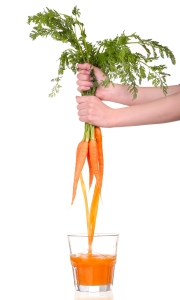
Some of the claims being made for certain brands of juicers on the internet would be laughable if they weren’t so seriously misleading. We would advise that claims being made that promote a single brand above all the competition may well be false.
In reality, apart from some notably poor quality Chinese made juicers, most will do a decent job. There are some exceptionally good models that are all pretty close to each other in terms of extracting the most juice from your ingredients. Some people may be happy to sacrifice a little performance in return for juicing speed, in which case a centrifugal model would be their best choice. Others might be looking for the best results on a single ingredient, so there may be a particular model that we would recommend on that basis. We try to match the juicer to your needs.
There is some waste involved with any juicer and the machine that extracts 100% of the juice from fruit and vegetables has yet to be invented. The quality of the juice is directly related to how well the produce is broken down in the machine to release nutrients. The quantity is determined by the pressure or force used to separate the juice from the pulp. Some may have particular strengths over others, so this advice section is broken down into appropriate sub sections.
We know that some of our juicers represent a significant investment and we want you to be happy with your purchase. If you need any further information when deciding on your choice we are always happy to talk you through the choices if you call the number at the top of the page.
Choosing a Fruit and Vegetable Juicer
Juicers capable of juicing fruits and vegetables generally fall into two main categories – Masticating or Centrifugal.
Masticating Juicers
Juicers using the masticating process (which effectively “chew” the vegetable up, releasing more nutrients) have been shown to produce juice with a slightly higher nutritional content and they incorporate less oxygen, giving juice with a longer nutritional shelf life. They divide into several sub-types that can be confusing to people new to the world of juicing. Some names are interchangeable.
Vertical Slow Juicers are the most popular and the most user friendly models for a wide range of ingredients.
Horizontal Single Auger Juicers are better for leafy greens and wheatgrass and good for everything else too.
Twin Gear Juicers take longer to use but offer the best juice quality of all.
Here’s some detail on some of our best sellers…
In recent years there has been a very exciting development in the world of single auger masticating juicers that really should be treated as a separate type. They are called vertical single auger juicers or vertical slow juicers. (Confusingly many are now also calling them cold press juicers).
An issue with low speed masticating juicers can be that they take a bit longer to use and clean. However, the new vertical auger juicers are still low speed but they actually juice reasonably quickly.This is because the augers and filter screens are much bigger on this type, so they take a bigger bite with each rotation. This is a massive step forward in juicer design and they are now the most popular type of masticating juicer. Every now and then we see an exceptional example come to market and we have been fortunate to partner with US brand Nama to offer their world beating juicers. 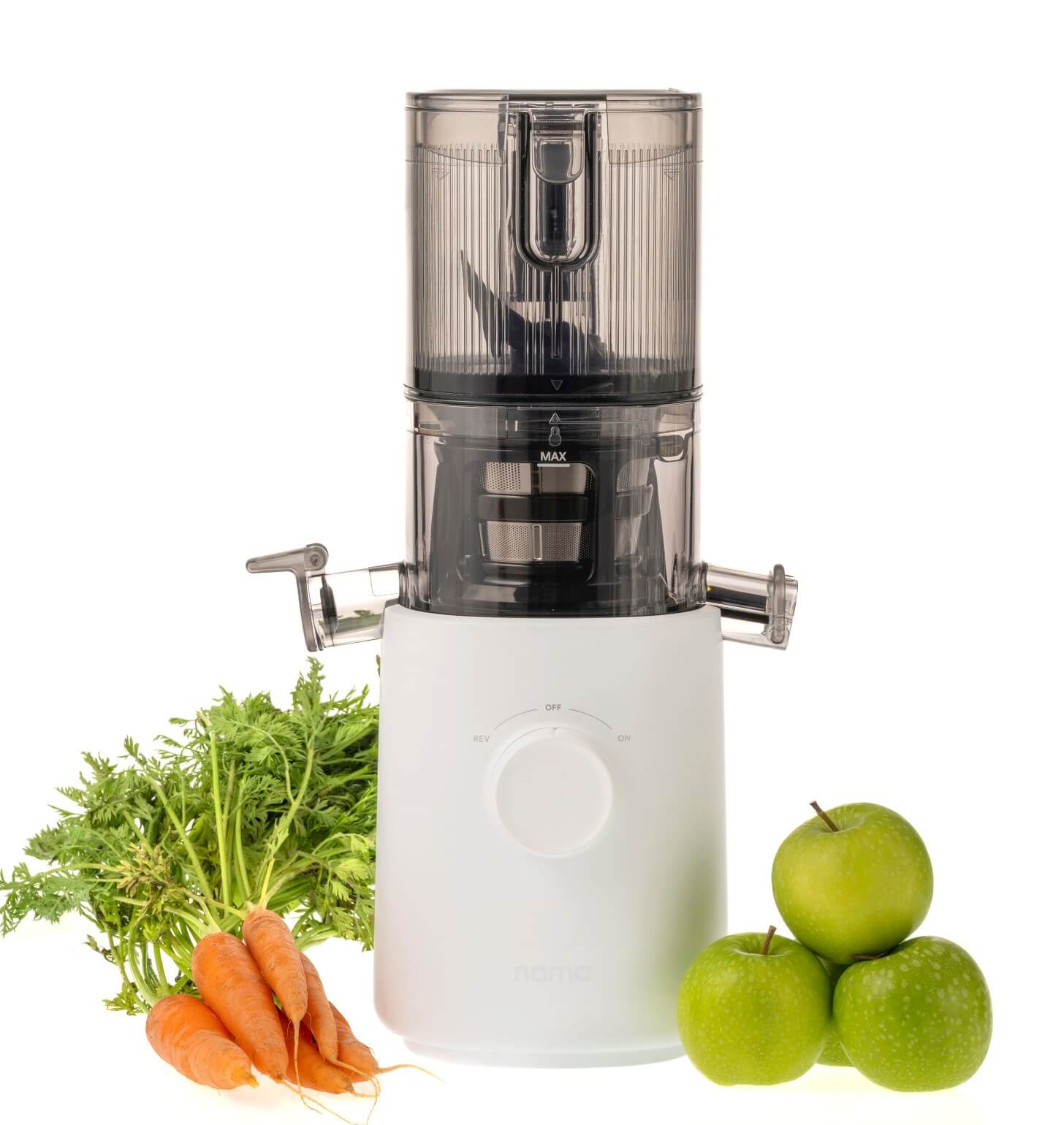 By developing their products from the ground up, using one of the two best manufacturers Nama have come up with the concept of batch feeding their vertical slow juicer so that you can juice whole recipes ‘hands free’ while you do something else. Find out more here. Vertical slow juicers often also have accessories for homogenising, making nut milks and frozen desserts.
By developing their products from the ground up, using one of the two best manufacturers Nama have come up with the concept of batch feeding their vertical slow juicer so that you can juice whole recipes ‘hands free’ while you do something else. Find out more here. Vertical slow juicers often also have accessories for homogenising, making nut milks and frozen desserts.
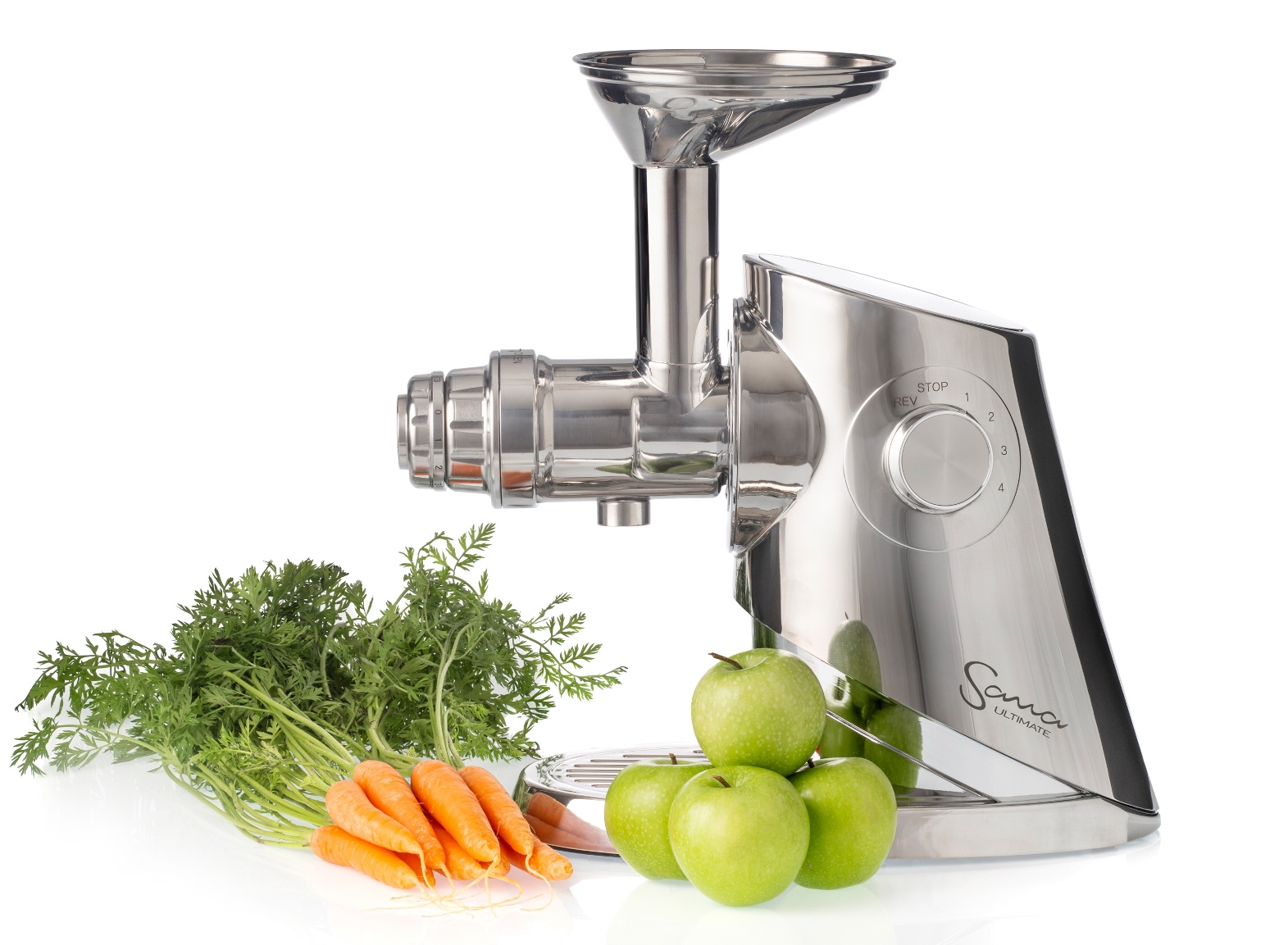 Horizontal Single Auger Masticating Juicers also use a slowly rotating screw that crushes produce against a stainless steel filter by a process similar to a mincing machine, but this time the juicing parts work horizontally. We think of them them as ‘best for greens’ because they are easier to live with than a Twin Gear model, although in reality the Twin Gear models are probably the ultimate greens machines. They too often have homogenising functions for making purees, nut butters, frozen fruit ice creams and more. The juicing process is a little slower than the vertical type or a Centrifugal Juicer.
Horizontal Single Auger Masticating Juicers also use a slowly rotating screw that crushes produce against a stainless steel filter by a process similar to a mincing machine, but this time the juicing parts work horizontally. We think of them them as ‘best for greens’ because they are easier to live with than a Twin Gear model, although in reality the Twin Gear models are probably the ultimate greens machines. They too often have homogenising functions for making purees, nut butters, frozen fruit ice creams and more. The juicing process is a little slower than the vertical type or a Centrifugal Juicer.
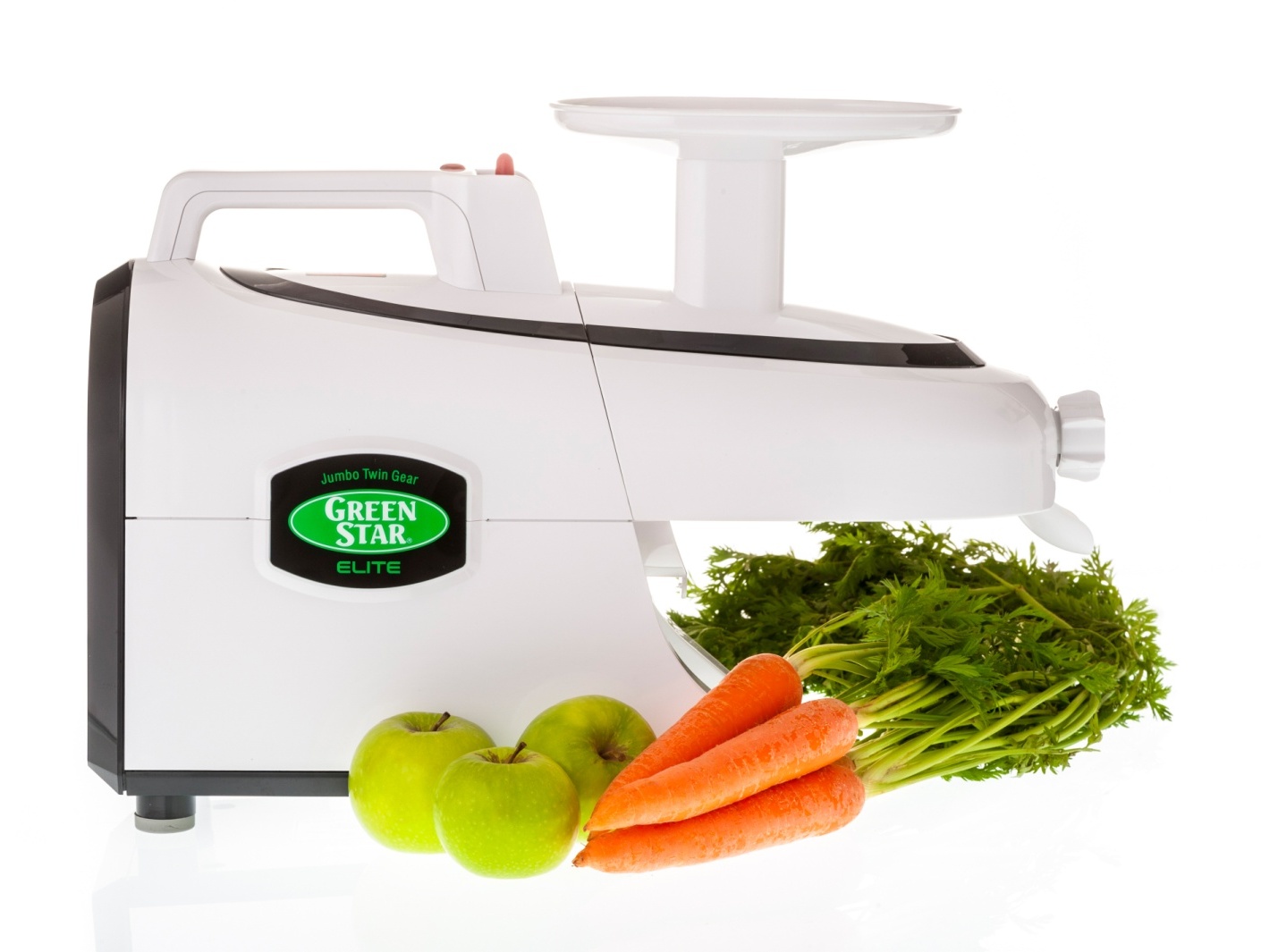 Twin-gear masticating juicers such as Green Star Juicers By Tribest use two cylindrical stainless steel gears which rotate very tightly together. Produce is crushed and pressed between the gears with juice being pressed out and passed through a screen. These juicers are often recommended by nutritional therapists to their clients because they offer the very best quality of juice from a domestic juicer. They achieve this because fruits and vegetables must pass through a tiny gap between the gears and get thoroughly broken down. The juicing and clean up process is a little slower than all other juicer types so they are less fun if you have a busy lifestyle and want to juice quickly. Twin Gear juicers are the optimum machines for getting the best possible results from wheatgrass, leafy greens and all other vegetables. It is very difficult to tell the difference in results between particular models – they are all exceptional
Twin-gear masticating juicers such as Green Star Juicers By Tribest use two cylindrical stainless steel gears which rotate very tightly together. Produce is crushed and pressed between the gears with juice being pressed out and passed through a screen. These juicers are often recommended by nutritional therapists to their clients because they offer the very best quality of juice from a domestic juicer. They achieve this because fruits and vegetables must pass through a tiny gap between the gears and get thoroughly broken down. The juicing and clean up process is a little slower than all other juicer types so they are less fun if you have a busy lifestyle and want to juice quickly. Twin Gear juicers are the optimum machines for getting the best possible results from wheatgrass, leafy greens and all other vegetables. It is very difficult to tell the difference in results between particular models – they are all exceptional
Centrifugal Juicers
Centrifugal juicers work by using a flat cutting blade on the bottom of a rapidly spinning basket. Food is shredded by the cutter and flung out to the sides of the basket. Due to the high centrifugal force, juice then passes through tiny holes in the basket and through a 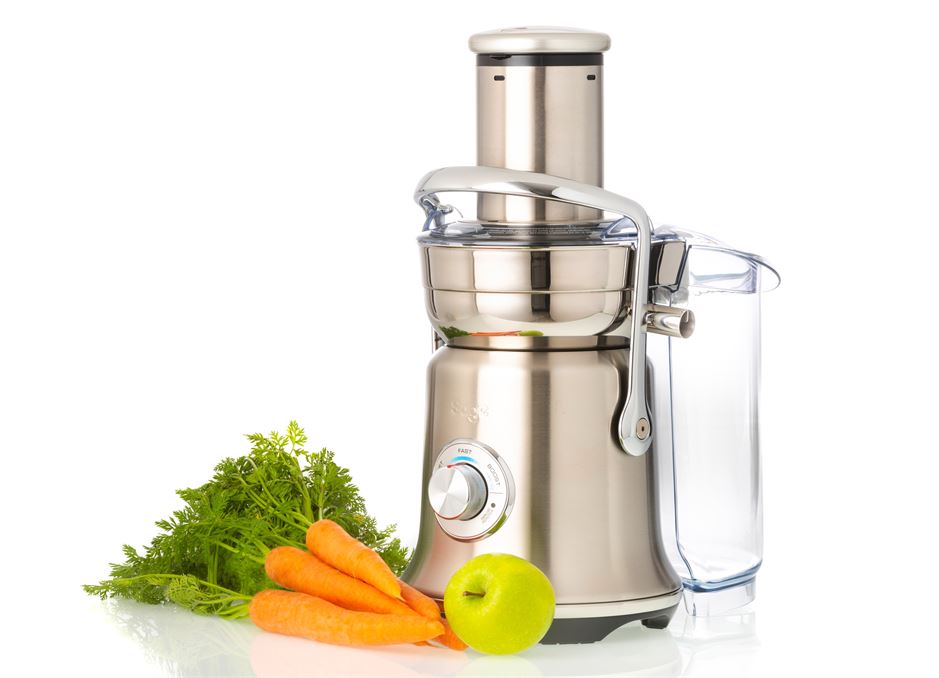 spout. In the case of the Sage range, pulp is spun off and collected in a separate container. The juice produced by centrifugal juicers is not quite as rich as juice from a masticating juicer. The extraction process and higher revs do incorporate more oxygen and therefore reduce shelf life, so it is best to juice fresh on a daily basis with these machines. By the nature of the cutting process, centrifugal juicers do not break down leafy green vegetables quite as well as masticating machines, and they are a bit wasteful with berries and softer fruits. However, they are a quick and convenient way of getting a healthy juice boost, so they make a great choice if you have a busy lifestyle and time is at a premium. It’s worth investing a little more to get a tried and tested model with higher juice yields. Our choice for best performance would be the powerful Nutri Juicer Cold XL, especially if you juice a lot of carrots and apples.
spout. In the case of the Sage range, pulp is spun off and collected in a separate container. The juice produced by centrifugal juicers is not quite as rich as juice from a masticating juicer. The extraction process and higher revs do incorporate more oxygen and therefore reduce shelf life, so it is best to juice fresh on a daily basis with these machines. By the nature of the cutting process, centrifugal juicers do not break down leafy green vegetables quite as well as masticating machines, and they are a bit wasteful with berries and softer fruits. However, they are a quick and convenient way of getting a healthy juice boost, so they make a great choice if you have a busy lifestyle and time is at a premium. It’s worth investing a little more to get a tried and tested model with higher juice yields. Our choice for best performance would be the powerful Nutri Juicer Cold XL, especially if you juice a lot of carrots and apples.
All these types of juicers can be found in the Fruit and Vegetable Juicers section of the site.
Choosing a Wheatgrass Capable Juicer
You may be wondering what wheatgrass juice is and whether it is something you are interested in if you are new to juicing. Wheatgrass juice is extracted from young shoots of grass grown from wheat grain and it is extremely nutritious. It is usually only drunk in shot-glass measures because of its concentrated nutritional values. You can find out more on our wheatgrass page.
Centrifugal juicers don’t juice wheatgrass. Twin Gear juicers and Single Auger or Screw Type juicers are very good for wheatgrass and other leafy greens because they operate at the lower speeds needed to deal with fibrous leaves.
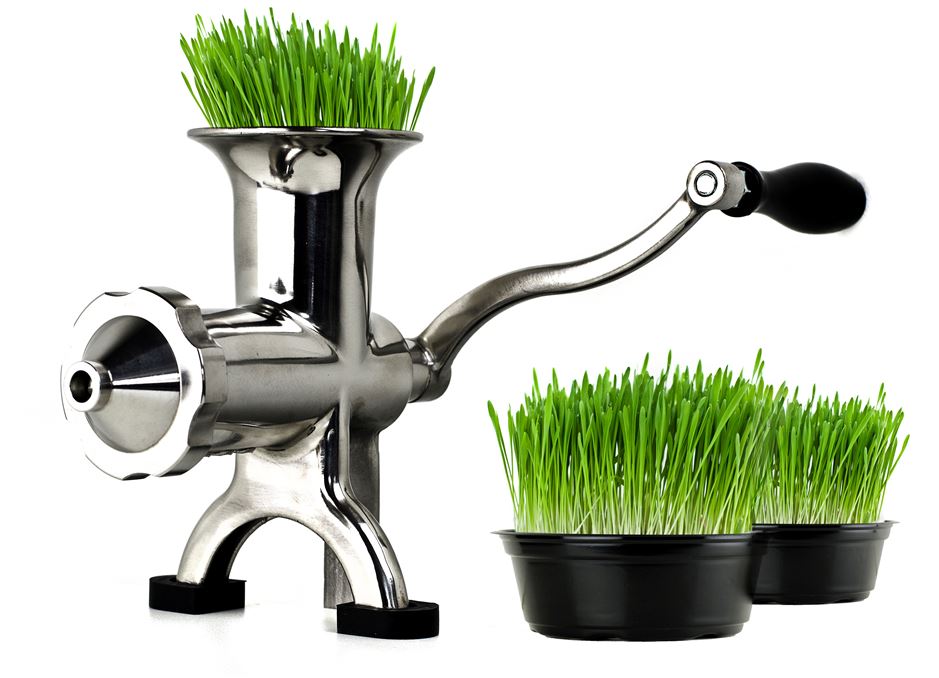 The important choice here is to decide if you want your main fruit and vegetable juicer to be able to do wheatgrass too. Low speed masticating juicers like the Sana 707 and the Omega 8006 will do a great job of wheatgrass, greens and all your other fruits and vegetables. If you already have a high speed juicer and want to take advantage of wheatgrass too, maybe opt for a separate manual juicer for wheatgrass like the Sana BL-30. If you want a ‘do it all’ juicer that is also relatively quick and convenient to use, the Vertical Slow Juicers in our range perform well on wheatgrass too.
The important choice here is to decide if you want your main fruit and vegetable juicer to be able to do wheatgrass too. Low speed masticating juicers like the Sana 707 and the Omega 8006 will do a great job of wheatgrass, greens and all your other fruits and vegetables. If you already have a high speed juicer and want to take advantage of wheatgrass too, maybe opt for a separate manual juicer for wheatgrass like the Sana BL-30. If you want a ‘do it all’ juicer that is also relatively quick and convenient to use, the Vertical Slow Juicers in our range perform well on wheatgrass too.
All the juicers that are capable of juicing wheatgrass are in our Wheatgrass Juicers section.
Choosing a Citrus Juicer
If you want the regular antioxidant benefits of a daily glass of freshly squeezed orange juice it is better to have a separate machine for oranges. Fresh is always best and vitamin C is needed for repair and regeneration of tissues in the body. Your body can’t manufacture vitamin C and fresh orange juice is one of the best ways to get it. Beware of so called ‘freshly squeezed’ orange juice from the shelves of supermarkets. Usually it has been pasteurised and the heat involved in this process inevitably destroys some of the goodness in the juice. You can juice oranges in any fruit and vegetable juicer but they are one of the few fruits you have to peel before juicing because of the bitter oils in the skin. If you don’t fancy the hassle of peeling a pile of oranges before you start juicing, a dedicated citrus juicer means all you have to do is cut the fruit in half and off you go. You have two groups to choose from; manual citrus presses and electric citrus juicers.
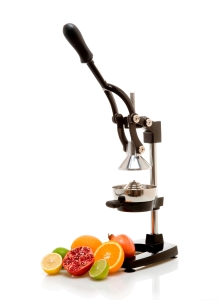 With the hand operated type you pop the half orange on the pressing cone and pull down a lever to squeeze out the juice. The Nutripress™ is by far the best example of a manual citrus press we have encountered. In fact it is so powerful it is one of the few juicing machines that can juice pomegranates. Pomegranates are even more rich in vitamin C than oranges and a cocktail of fresh OJ and pomegranate juice is lip-smackingly gorgeous.
With the hand operated type you pop the half orange on the pressing cone and pull down a lever to squeeze out the juice. The Nutripress™ is by far the best example of a manual citrus press we have encountered. In fact it is so powerful it is one of the few juicing machines that can juice pomegranates. Pomegranates are even more rich in vitamin C than oranges and a cocktail of fresh OJ and pomegranate juice is lip-smackingly gorgeous.
If you want electricity to do the work, we have a great selection of motor powered citrus juicers to choose from. With electric citrus juicers the half orange is pressed either by hand or by a levered top cone onto a spinning reaming cone. This extracts the juice and passes it through a strainer. For those of you who like their orange juice with ‘bits’ don’t worry, these machines are designed to filter out the pips and leave a little texture in the juice.
 Register / Login
Register / Login 





